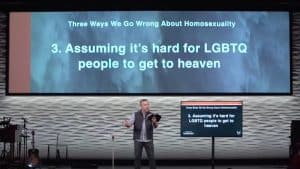A half-truth masquerading as the whole truth becomes a complete untruth.
—J. I. Packer—
The whole truth is generally the ally of virtue; a half-truth is always the ally of some vice.
—G. K. Chesterton—
Key point: J. D. Greear’s sermon and blogpost on homosexuality are ominous for several reasons, not the least of which is the unbiblical direction they are taking Southern Baptists and the rest of the evangelical world with regard to the sin of homosexuality. It is vital that Christians understand Greear’s errors so they can know the truth themselves and share it with others.
This article originally appeared as a 2-article series. Part 1 is available here and part 2 here.

James David—J. D.—Greear, 46, is the pastor of the multi-campus Summit Church in North Carolina, a church that sees almost 10,000 in attendance every week. Greear also is the president of the Southern Baptist Convention, having been reelected to a second one-year term at the SBC’s annual meeting in June of this year in Birmingham, Alabama. J. D.’s influence is great, so if he gets something wrong, many people will be potentially confused and/or misled.
On January 27, 2019, Greear preached a sermon on Romans 1:24-32. He titled it “How The Fall Affects Us All.” As you might expect from the title, Greear emphasized that in Romans 1:24-32 and the verses surrounding it, Paul paints a picture of what rebellion against God looks like—a rebellion, Greear says, that is common to all people, everywhere. The pastor and Southern Baptist Convention president asserted that Paul even was writing about himself.
I do not doubt that Greear sincerely believes this is what the Scripture teaches. Yet in a sense, with this interpretation he has more leverage to preach against pride and certain other sins named in these verses and to avoid focusing on the uncomfortable topic of homosexuality. If all people are equally rebellious, then anyone who points out specific sins can be accused of not pointing first to himself. If you think other people stand guilty before God, then look in the mirror! After all, pride, or being “arrogant” and “boastful” — is one of the sins Paul names!
One doesn’t have to believe that everyone is a part of this group of rebellious sinners, though, to understand that he or she must avoid pride. While all are sinners and have rebelled against God, this passage is not saying that all have been equally rebellious. Everyone needs God’s grace and forgiveness, but not everyone has “suppress[ed] the truth in unrighteousness.”
The apostle was writing about a specific group of people who have descended so far into depravity that “God gave them over in the lusts of their hearts to impurity, so that their bodies would be dishonored among them” (Romans 1:18,24). Keep this interpretation in mind as you continue to read. While we won’t examine Greear’s sermon, we will discuss statements he made in an article based on it. Understanding that Paul wrote about a specific group of people in Romans 1 but that Greear sees him as having written about everyone will help you see why Greear tends to be harder on the church than one might expect, and softer on the sin of homosexuality (even though the Summit Church pastor does acknowledge that homosexual activity is a sin.)
Doubling Down
Fast forward seven months. On Wednesday, August 28, 2019, Greear posted an article on his blog titled “Three Ways We Go Wrong When Discussing Homosexuality.” In doing so, he essentially doubled down on the assertions he made in his sermon. His article carries the same content his January sermon did, although it was, of necessity, streamlined.
Like his sermon, Greear’s post offers many true statements. In the mix, however, are some dangerous implications, falsehoods, and half-truths. Six items stand out. We’ll consider these in the order in which they appear in the post. Be forewarned! Things are not totally as Greear presents them.
The Church’s “Failure”
Item one: Greear goes wrong when he maligns the church for not dealing with the subject of homosexuality effectively through the years, and when he accuses the church of not caring about those experiencing same-sex attraction.
The pastor begins his article by writing,
Historically, we in the church haven’t done a great job in conversations about homosexuality, and we’ve done an even worse job caring for those experiencing this.
He says this without offering any evidence whatsoever. Video blogger A. D. Robles challenges Greear on this point.

This is a weird article.…So, it starts off—it says, “Historically, we in the church haven’t done a great job in conversations about homosexuality, and we’ve done an even worse job caring for those experiencing this.” …I find this to be one of the most annoying things. People always say stuff like this, and they just expect you to believe it. They don’t ever have to prove it. It’s like—Well, the church is horrible about talking about race.…And it’s like, well, OK,…but prove it! I don’t believe this for a second, that the church has done a terrible job treating or caring for people that experience homosexuality. I don’t believe it. And actually, his article itself, proves that this is just not the case. He talks about Rosaria Butterfield, and how an RPCNA [Reformed Presbyterian Church of North America] minister led her to Christ. Obviously this guy knew how to do it! And he obviously learned it from somewhere. So people have been talking about the right way to talk about homosexuality for a very long time.
I’m sure A. D. would not try to make the case the church has done a perfect job with regard to the issue of homosexuality, but to malign it for having done a bad job “historically” — J. D.’s term — is unfair.
I fear that today, many churches actually may be doing a much poorer job of really caring about and helping homosexuals than the church historically did when it spoke frankly about homosexuality as a sin. Authentic love, grace, and compassion must be on display, of course; and we must understand some key truths about homosexuality and the mind-set of many homosexuals today.
That said, true compassion will not ignore the truth. In fact, it always will find ways to share it. As evangelist Ray Comfort has said, “How much do I have to hate homosexuals to lie to them about what the Bible says?” While I’m not accusing J. D. Greear of deliberately lying, I believe he is misled and is misleading people—often subtly—on this issue.

Lost to Saved—What Does that Mean?
Item two: Greear goes wrong when he fails to explain that for the man or woman who’s been involved in homosexuality, moving from being spiritually dead to being spiritually alive includes moving toward heterosexuality.
Greear makes a true statement, but one that he fails to sufficiently explain. He writes,
Possessing a desire innately [to sin] just shows us that we have corrupt hearts and we need to be born again. The gospel message is not “Let the gay become straight” but “Let the dead—and that’s all of us—become alive.”
Ravi Zacharias (disclaimer) puts it this way, “Jesus Christ did not come to make bad people good, but to make dead people alive.” Greear and Zacharias are right, and so are a great many Christians who’ve come out of homosexuality when they explain the transformation they’ve experienced. Many times you will hear them say, “It’s not Gay to Straight. It’s Lost to Saved.”
Again, they’re right—but more needs to be said. More must be said. If we’re not careful, we may leave the impression that a Christian can remain involved in homosexuality. Such is not the case.
When a person who’s been involved in homosexuality moves from lost to saved, where does that put him or her in terms of homosexuality and other sinful habits and desires? These passages, among others, tell us: Romans 8:12-13; 12:1-2; 1 Corinthians 6:9-11; 2 Corinthians 5:17; Colossians 3:5.
Another way a person who came to Christ out of homosexuality might describe the Lord’s call on his or her life is this: “God doesn’t call me to heterosexuality, but to holiness.” Here we must wave a red flag. Wait a minute! Make sure you don’t let your understanding of God’s call pave the way for you to make excuses to sin or to flirt with temptation!
-
-
- We never would say God doesn’t call a thief-turned-Christian to be productive and generous, but to holiness.
- We never would say that God doesn’t call a liar-turned-Christian to tell the truth, but to holiness.
- Nor would we ever say that God doesn’t call a murderer to cease killing people, but to holiness.
-
Why? We understand intuitively that in each of these instances the God-honoring activity is a part of holiness. (See Eph. 4:17-32.) Because heterosexuality is a part of God’s good design, it also is a part of holiness. Therefore, the call to holiness for the Christian with homosexuality in his or her past involves heterosexuality—or at least moving toward it. At bare minimum, this means renouncing homosexuality as an identity and turning away from homosexual activity altogether.
Because heterosexuality is a part of God’s good design, it also is a part of God’s call to holiness for every believer.
This quite likely will involve a struggle. Some may struggle with same-sex attraction for some time, or even until the day they die, but the power of Christ to resist temptation is real and effective. Just ask Becket Cook, a former homosexual who came to Christ at a church service a number of years ago. He told about his journey to faith on the Eric Metaxas show on August 8, 2019. In the on-air interview Becket said, “I knew in that moment [of my conversion to Christ] that being a gay man was no longer who I was, and that that wasn’t going to be a part of my life anymore. I just knew instantly. I knew in the core of my being that that was not my identity anymore.”
Has same-sex attraction totally left him? No, but it has diminished. Becket’s relationship to Christ now defines who he is. Recently he released his first book, A Change of Affection: A Gay Man’s Incredible Story of Redemption.
Christians, and especially Christian leaders, must be careful, lest they leave the impression that a Christian identity and a gay identity are compatible. They aren’t!
The Elusive Search for a “Gay Gene”
Item three: Greear goes wrong when he implies homosexual are “born that way.”
Pastor Greear writes,
If someone says, “But I was born this way,” I don’t dispute that. But possessing a desire innately doesn’t make it right.”
The last sentence is correct, but in the first, Greear, however unintentionally, perpetuates the myth that a gay gene exists or that homosexuals are genetically “hardwired.” Science never has discovered a “gay gene,” and a recent extensive study shows no likelihood that it ever will. While news of this particular study came out immediately after Greear posted his article, it has been widely known for many years (despite perceptions and myths) that no evidence exists for a “gay gene.” (Go here and here.)
J. D. Greear has no excuse for misleading people on this point—even if, when he did, he was focusing on making another point that was fully true.
All Sins Are Not Equal
Item four: Greear goes wrong when he makes the case that homosexuality isn’t worse than numerous other sins. This minimizes the serious nature of homosexual sin.

We’re wrong if we think same-sex behavior is a fundamentally different type of sin, says SBC President Greear. In Romans 1, Paul lists same-sex behavior as one corruption among many. We may not think of deceit, boasting, greed, or a rebellious attitude toward parents as equally depraved as same-sex behavior. But if you look at Paul’s list, they are.
Whoa! Wait just one minute! It’s true that homosexuality isn’t the only sin Paul mentions in Romans 1:18-32, but this does not mean that all the other sins listed, or that all other sins in general, are as offensive to God as homosexuality. Sure, one sin is enough to render a person a sinner in need of divine forgiveness, and one sin is enough to make a person “eligible” for hell. Yet, as we said earlier, Paul is talking about a specific group of people sliding more and more deeply into sin. They rejected core truths they innately understood, so they therefore “suppress the truth in unrighteousness.…Therefore God gave them over in the lusts of their hearts to impurity, so that their bodies would be dishonored among them. For they exchanged the truth of God for a lie, and worshiped and served the creature rather than the Creator, who is blessed forever.”
Yet, as Pastor Joseph Spurgeon astutely observes, Greear essentially says, “Yeah, [homosexuality is] a sin but don’t get your panties in wad because there are other sins too.”
J. D. Greear essentially says, “Yeah, [homosexuality is] a sin but don’t get your panties in wad because there are other sins too.”
—Pastor Joseph Spurgeon—
Perhaps the reason Christians and the Church of Jesus Christ through the centuries have spoken so forcefully against homosexuality, and warned so urgently against it, is because God’s Word speaks in alarming terms about this sin.
-
-
- Paul says sexual sins are unique because, while other sins are committed outside the body, sexual sins involve the body.
- Homosexuality is unique among sexual sins because it is unnatural. Heterosexual sex outside of marriage, though sinful, is natural.
- Sodom and Gomorrah were destroyed, in part, because of homosexuality.
- Homosexuality also is called an abomination.
- It is a sin associated with God’s giving people up to their vile passions.
- In addition, Scripture is explicit that those who practice homosexuality will not inherit God’s kingdom. While the Bible says this about sinners guilty of other sins as well, the weight Scripture assigns to homosexuality is more than significant.
-
In saying other sins are as bad or worse than homosexuality, Greear effectively minimizes the seriousness of an act the Bible calls “an abomination” (also go here). In a day when homosexuality is celebrated and treated as something to be proud of, we must not downplay, even unintentionally, it’s sinfulness or its ominous nature.
Pharisaical?
Item five: Greear goes wrong when he implies that condemning homosexuality and warning against it are pharisaical.
Greear writes,
We only grasp the gospel when we understand, as Paul did, that we are the worst sinner we know (1 Timothy 1:15), and that if Jesus came to die for us, there is no one that he would not die for. When we realize that, we’ll cease being a Pharisaic teacher of the law and we’ll become a gospel witness.
Certainly, humility is essential for every believer. At the same time, warning people and the culture about homosexuality’s dangers—physical, spiritual, and otherwise—is not being prideful or Pharisaical. It’s being faithful to God’s calling!
People in our day have become too casual about sin. We must guard against this and lovingly, yet clearly, warn people that while God is love, He also is a God of absolute holiness. He cannot abide sin. Isaiah was overcome with a strong sense of his sin and unworthiness when he saw a vision of God, in His holiness, seated on His throne. The prophet Habakkuk wrote, “Your eyes are too pure to approve evil, And You can not look on wickedness with favor.” We must recover this understanding in the church!
The Roads to Heaven and Hell
Item six: Greear goes wrong—very wrong—when, quoting social justice advocate Tim Keller, he says, “Homosexuality does not send you to hell. I know that because being heterosexual doesn’t send you to heaven.”

Here is the statement Greear gave in his sermon, in context.
In the article, Greear wrote the same thing.
Let me say something very clearly: Homosexuality does not send you to hell.
I know that because being heterosexual doesn’t send you to heaven. What sends you to hell is refusing to allow Jesus to be the Lord and center of your life, regardless of how that manifests—whether it’s in your refusal to let Jesus be Lord over your sexual life or in your refusal to obey him with your money or your right to control your career.
It’s not where you express your rebellion that matters but that it exists.
Taken together, the first two sentences are blatantly unbiblical! No one ever can know any particular trait, quality, or action will not send a person to hell “because” — J. D.’s term — its opposite doesn’t make a person qualified to enter heaven! This is dangerous! It is treading on razor thin spiritual ice! Can’t you see how hearing such a statement would effectively relieve concern in a homosexual person’s mind? Hey! That’s right! Heterosexuality can’t get anyone into heaven—so my homosexuality certainly won’t condemn me to hell! Whew!
Don’t be surprised when homosexuals and same-sex attracted people who “hear” Greear’s full statement don’t really hear the last part of it—that “[w]hat sends you to hell is refusing to allow Jesus to be the Lord and center of your life, regardless of how that manifests—whether it’s in your refusal to let Jesus be Lord over your sexual life or in your refusal to obey him with your money or your right to control your career.” Why won’t they hear it? Because the statements made immediately before effectively give homosexuals and those dealing with same-sex attraction a “feel-good pass.”
God is faithful to His Word, however, and will judge unrepentant sinners—for their sins!
The Impact of the Whole
As we have seen, each of J. D. Greear’s statements poses danger and potential danger. The subject of homosexuality is not something to take lightly or to minimize. We began this post by highlighting Greear’s sermon on homosexuality and Romans 1, which he preached in late January of this year. Theologian and video blogger Jon Harris critiqued the sermon a few days later on his podcast.
While each of Greear’s misleading statements poses serious problems, those issues aren’t as damaging as the effect of the collective whole. Carefully read Harris’s final comments about Greear’s sermon below. They’re a warning flare for the Southern Baptist Convention and for all of evangelicalism.

Southern Baptists are in trouble. Like I said before, I’ve had some of my own experiences with trying to minister to homosexuals. This kind of stuff is not helpful. It’s really not helpful. It gives somebody the impression that they can live with these desires, that they’re not that big of a deal to live with them. At least it has the potential to give them that. It also has the potential to give Christians the idea that this isn’t really that big of a deal.
I would submit to you that Greear has put in a framework [from] which it’s not a big jump to say—to easily lead to, it’s like two rungs up the ladder—gay Christianity. I think he may even be advocating it here, he’s just using so much veiled language, but [here’s where this is headed]. The orientation of homosexuality is OK as long as you don’t act on it, that idea, and creating a separate space for gay Christians, this category.
This is the President of the Southern Baptist Convention. I don’t know exactly why he’s saying this, but I can take a guess. I do think that Southern Baptists have been caving. And Greear has, before this even happened, done a little bit of caving on other things. I’m not going to get into that. But there’s this need, in a sense, to be loved by the world, to get the numbers up, to show the world that Hey! We have the same concerns as you. Look at us. We’re not bigots. We’re not the things the world says we are.
The bottom line is that the world will always hate us. The world will always hate Christians because the world loves sin. And anyone calling a sinner to repentance will be hated by those who love their sin. That’s just the bottom line.…
We need to get back to the authority of Scripture. Stick to the text. Go through it verse by verse, exegetically, original languages—I mean, these are important things. And I’m afraid those methods are not being utilized to further this agenda. When I say agenda, I’m not saying conspiracy, but there is an agenda out there to get the world to like us. And I think the social justice message, I think this is just one, if you will, front, in that social justice fight. These are the oppressor and oppressed categories. They kind of come out, even in Greear’s sermon a little bit. The church being an oppressor, and then homosexuals being oppressed. And that’s why the emphasis on our needing compassion. We do need compassion, but I fear that there’s something behind this which is on the nefarious side. And it’ll be interesting to see what happens in the next year.
Well, J. D. Greear has, as we have said, doubled down with his blogpost.
When will he be forcefully challenged? Actually, he has been—by Jon Harris and several others—but as of yet, public pressure has not risen to a point where he has been held accountable for his bad theology and misleading statements.
This is why the movie Enemies Within the Church is so important. Unfortunately, Greear is just one of many popular evangelicals taking the church in a bad direction. Under the noble-sounding mantra of “social justice,” they are perpetuating false teachings and dividing the church. Enemies Within the Church will expose them. Learn more about this informative, soon-to-be-released documentary here. Prayerfully consider supporting this effort.
Meanwhile, learn everything you can. You’re invited to start here. Stay informed, and inform others.
A great deal is at stake!
An epilogue is available here.
Copyright © 2019 by B. Nathaniel Sullivan. All rights reserved.
Unless otherwise indicated, Scriptures in this article have been taken from the NEW AMERICAN STANDARD BIBLE®, Copyright © 1960, 1962, 1963, 1968, 1971, 1972, 1973, 1975, 1977, 1995 by The Lockman Foundation. Used by permission.
top image credit: Lightstock


